Obituary: Gay rights pioneer Roger Lockyer
- Published
Roger Lockyer: The historian who made LGBT history
When Roger Lockyer met his future husband Percy Steven on a blind date in 1966, their relationship made them criminals in the eyes of British law.
By the time the distinguished academic and author, a reader at Royal Holloway and Bedford Universities of London, died shortly before his 90th birthday, the pair lived as a legally married couple - having tied the knot in 2014.
Their remarkable journey drew worldwide press attention, when, in 2005, they became one of the first couples, external to enter into a UK civil partnership. Invites to Downing Street followed.
Together for 51 years, they proudly marched in this year's Pride in London parade waving rainbow flags.
Accidental icon
However, this was never the plan. Historians usually document history - they rarely walk into the pages themselves.
The couple had lived a quiet, cultured existence in an elegant flat in Marylebone, central London, until the modern era of LGBT rights came knocking and propelled them into the limelight.
Pictures of the pair in sharp suits saying their civil partnership vows, and later popping a magnum of champagne on the steps of the Westminster register office, appeared on TVs and in newspapers across Europe, the US and Canada.
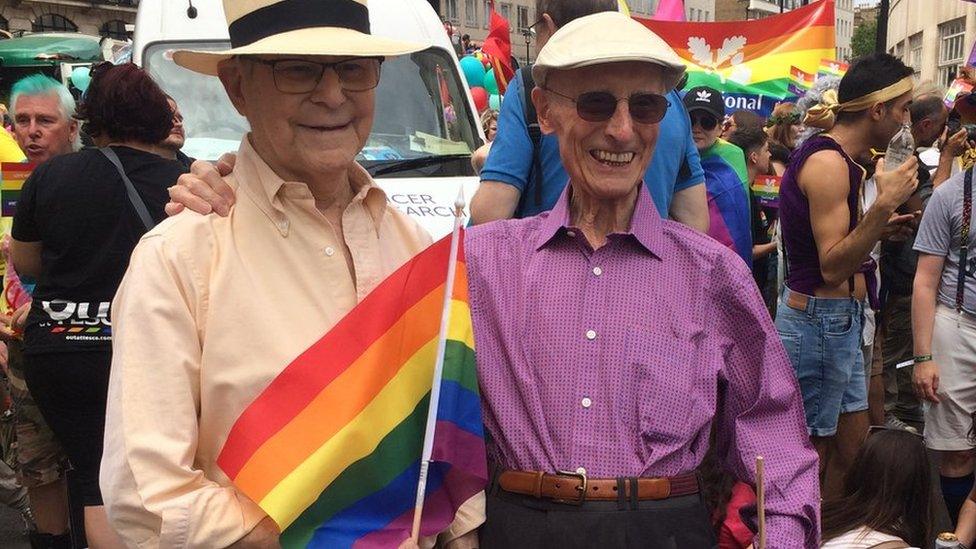
Roger Lockyer (R) with Percy Steven at Pride in London 2017
Eager journalists clamoured for their attention, aware of the rarity of their find; a couple whose relationship was unique, not just for its wit, passion and longevity, but also because it had survived half a century of seismic change in legal and social attitudes towards sexuality.
Roger later remarked: "We had these cameras following us down the street and neighbours leant out of windows to wave us off. Friends spotted us on television in France and Germany.
"After Elton John, we felt like the most famous gay men in the world."
They went on to feature in multiple interviews, including the BBC's recent docudrama Against the Law, marking the 50th anniversary of the Sexual Offences Act 1967, which partially decriminalised homosexuality in England and Wales.
Dangerous double life
Born in London in 1927, Roger completed National Service in the Royal Navy before reading history at Pembroke College, University of Cambridge.
He graduated with first-class honours, beginning an eminent career as an academic and author of nearly a dozen books on 15th and 16th Century history.
His seminal volume Tudor and Stuart Britain, first published in 1964, remains a core text for many undergraduates in the UK.
But Roger's private and professional lives remained separate by necessity.
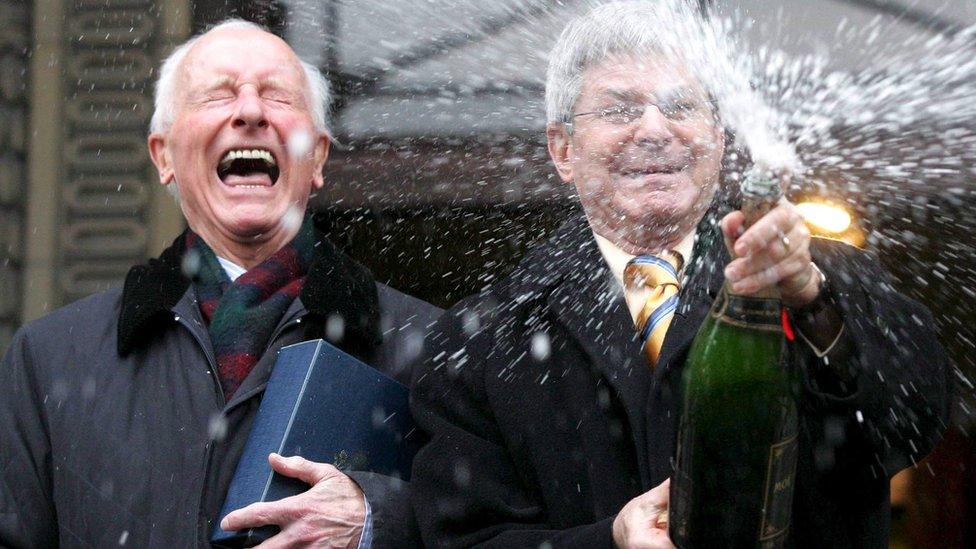
Roger (L) celebrates his civil partnership with Percy on the steps of Westminster register office in 2005
His stories of escapades as a young gay man in the 1940s, 1950s and 1960s were as mischievous and comic as they were a window into an often hostile world, where as second-class citizens homosexual men had to tread carefully on the edges of society.
National Service was "fantastic" because it was filled with so many gay men.
Cambridge was equally "very, very gay", causing one heterosexual undergraduate to complain to him, through tears, that there was "something wrong with him" because he was attracted to women.
"I think you'll be alright Douglas," Prof Lockyer replied drily.
But those social bubbles did not conceal the potential danger of living in a country where men convicted of a being in a same-sex relationship risked jail, loss of their livelihoods, or even death.
Prof Lockyer, who once quipped that the passing of the 1967 act of parliament "took the fun out of breaking the law", equally emphasised its brutal impact.
"It was exciting in a way and almost an adventure. But looking back at it now one realises that potentially it could be awful.
"We know people who were sent to prison and their careers ruined.
"The friend who introduced us was killed and his murder was never solved. It was a deeply unpleasant society."
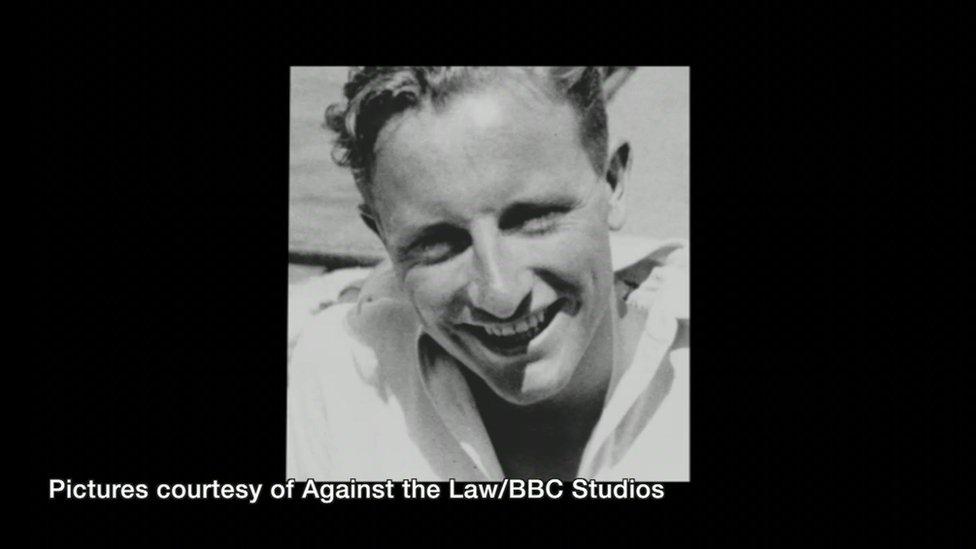
Roger Lockyer in his younger years
Despite the dangers, a vibrant, closely guarded, gay community bubbled under the surface.
"There was this semi-secret, sub-rosa network of gay clubs we would go to," Prof Lockyer explained.
One bar-hopping friend and ex-lover was Jeremy Wolfenden, the gay son of Lord Wolfenden, whose radical report controversially recommended decriminalising homosexuality in 1957.
"Places like the Rockingham in Soho... was for well-to-do, sophisticated people - it had its own writing paper.
"You had to give your name at the door and I said: 'Jeremy, aren't you a little worried that you give your name 'Wolfenden'?
"He said: 'Oh don't worry my dear I always give your name.'
"So I'm recorded as having a much busier social life when it was in fact Jeremy capering about town while his father made these important recommendations to the government about 'queers'."
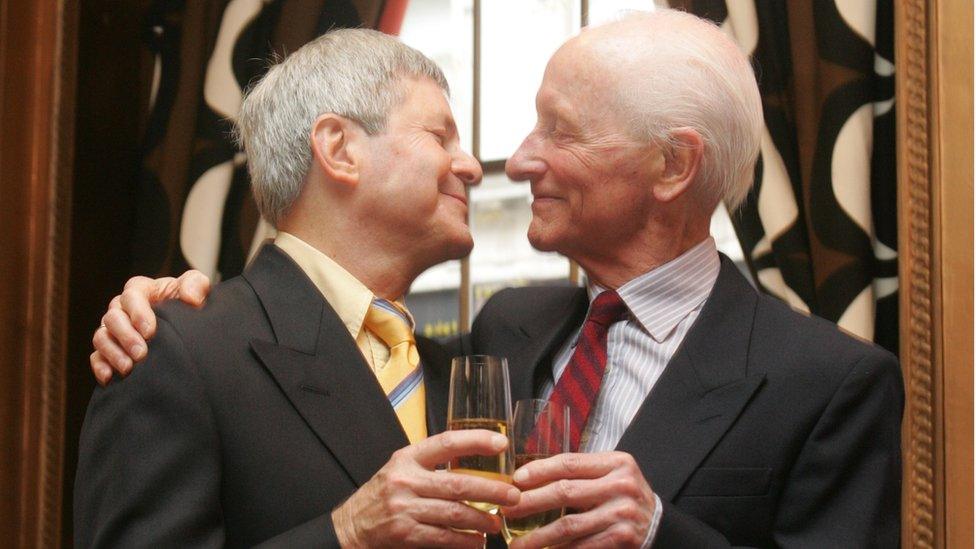
Percy with Roger (R) on their wedding day in 2014
The historian met his future husband Percy Steven, a South African-born actor and lecturer, now 78, on that blind-date in London.
The meeting was an initial "disaster" but Roger, wilting daffodils in hand, had already fallen in love.
He said: "The moment I set eyes on Percy I knew that even though he was being horrid, he was the person I was going to spend the rest of my life with, so I persisted."
"And I gave in!" Percy replied cheerfully.
For many gay men of their generation, the changes to the law that made them recognised spouses - thereby ensuring the right not to be kicked out of hospital rooms if they were ill, or lose their home due to unfair tax laws when one of them died - came too late.
Roger and Percy's shot to fame late in life came as a pleasant surprise and they embraced opportunities to be as visible as they had previously been secretive.
They also enjoyed plenty of glasses of champagne.
On the night he died, with Percy by his side, Roger's appearance in BBC docudrama Against the Law received a standing ovation at the Barcelona International LGBT Festival.
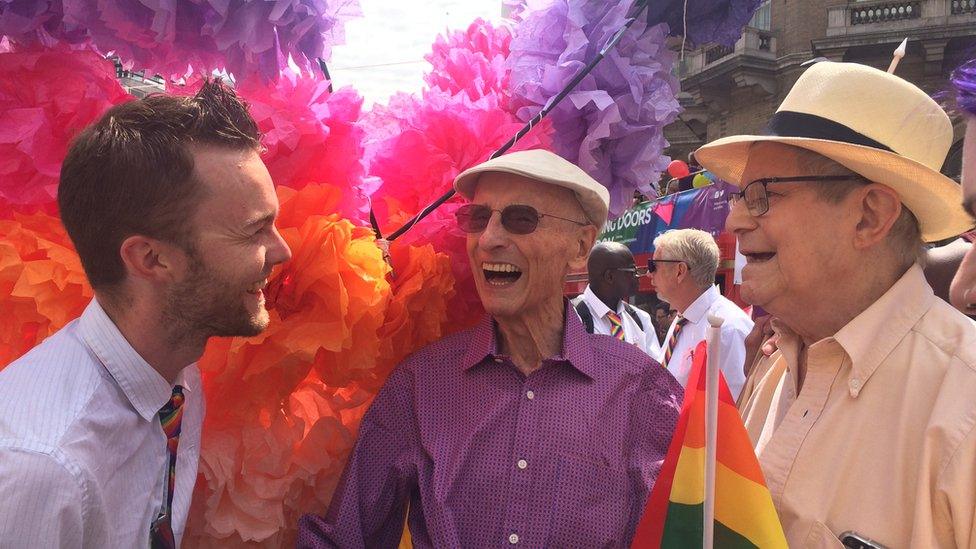
Roger and Percy enjoyed celebrating at Pride in London 2017
Speaking to the BBC in 2015, he said: "I think that particularly being a historian… people do know a bit about their own history and what others went through and it makes for a richer and fuller life if they do.
"I remember distinctly walking down the street after the ceremony thinking: 'I am as legal a person as anybody else. I am a full citizen at last.' It was a wonderful feeling."

Professor Roger Lockyer, historian, author and activist, was born on November 27, 1927. He died on October 28, 2017 aged 89.
He leaves his husband Percy Steven and a niece.
Professor Roger Lockyer: A Life will be broadcast on Radio 4's PM Programme from 17:00 GMT.